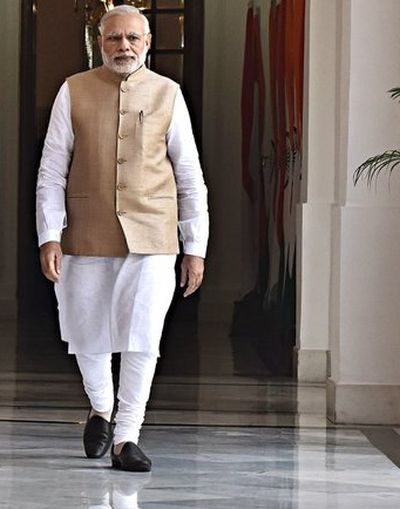'Modi was in as sweet a spot as is possible for an Indian prime minister in mid-term.'
'Why, then, did he plunge into this massive disruption?'
'The answer,' argues Ashok Malik, 'lies in a single word: Belief.'
 In the normal course, politics is a careful, cautious and calibrated profession.
In the normal course, politics is a careful, cautious and calibrated profession.
When in government, politicians tend to turn even more conservative and risk averse.
Given this context, Prime Minister Narendra Modi's demonetisation does not fit the conventional mould.
Why did he go ahead with it? What were his motivations?
As even his opponents have been forced to concede today, the economy had been repaired significantly in the past two years.
Foreign investment had picked up.
Consumption was slowly beginning to recover some of very substantial lost ground.
Domestic private sector investment and job creation remained a problem, but there was hope that passage and implementation of the Goods and Services Tax would indicate a broad-based recovery by 2019, when Modi led the Bharatiya Janata Party into its re-election campaign.
Modi was in as sweet a spot as is possible for an Indian prime minister in mid-term.
Why, then, did he plunge into this massive disruption, one that was unprecedented in a healthy (as opposed to a collapsing or inflation-assaulted) economy and the consequences of which could be surmised but never accurately forecast?
The answer lies in a single word: Belief.
While 'black money' is a hot-button issue in Indian politics and Modi used it as his marketing tool on November 8, the fact is that promoting greater reliance on formal banking channels and digital payments where feasible and among those for whom it is feasible was always part of the demonetisation blueprint.
It was not an add-on of afterthought. Neither is the promise to attempt to clean up the property market.
In comparison to 2014, the BJP today is much more Modi's party. In 2019, it is likely to be even more so.
All this gave Modi the political capital to overcome doubting Thomas MPs, who had to abide by his decision.
How will demonetisation play out politically?
Much will now depend on what steps Modi takes to continue his battle against slush funds and corruption.
The Uttar Pradesh election in February-March will be a testing ground for the faith people retain or don't retain in the BJP.
One suspects, though, that the recasting of Modi as at once a responsible leader and a resurgent prime minister is aimed at making him, once more, champion of the underdogs and the issue of a referendum in 2019.
The political after-effects of demonetisation will be with us longer than the economic after-effects.
Ashok Malik is a Distinguished fellow, Observer Research Foundation.











